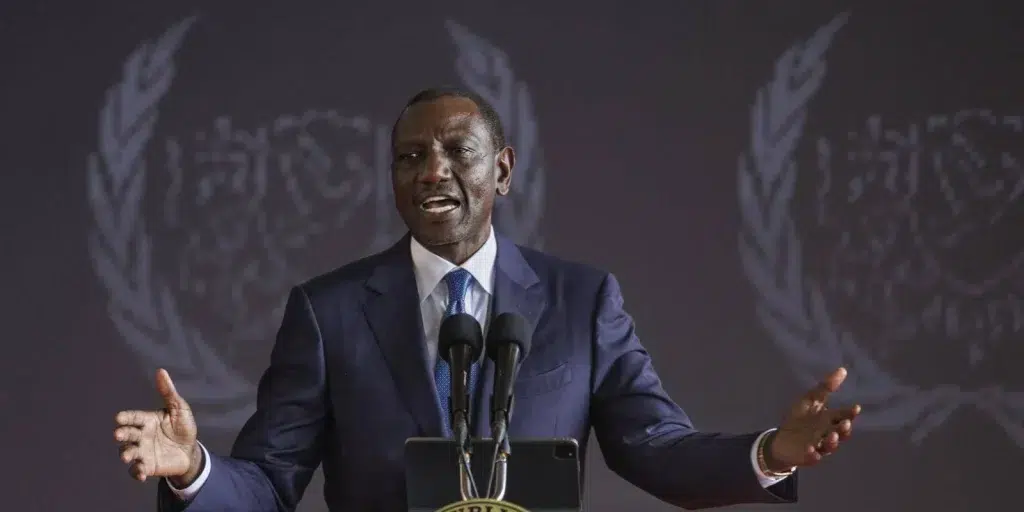
Kenyan President William Ruto’s historic state visit to the United States marks a pivotal moment in US-Africa relations, bringing renewed focus on economic and strategic partnerships. As the first African leader to be granted this honor in over 15 years, Ruto’s visit underscores Kenya’s emergence as a key player in East Africa’s economic landscape. We delve into the strategic implications of this visit, exploring how it can drive investment opportunities and reshape the financial dynamics between the US and Africa.
Kenya’s Diplomatic and Economic Ascendancy
President Ruto’s rise to prominence on the global stage is a testament to Kenya’s growing influence. Once an unlikely candidate due to his past indictment by the International Criminal Court, Ruto has since repositioned himself as an indispensable ally to the US. Under his leadership, Kenya has strengthened its role as East Africa’s diplomatic and business hub, often referred to as the “Silicon Savannah” for its burgeoning tech industry.
US-Africa Relations: A New Era of Strategic Partnerships
The US has been keen to demonstrate its commitment to Africa, particularly as China and Russia expand their influence on the continent. President Joe Biden’s administration has highlighted Africa’s strategic importance, promoting equal partnerships that advance mutual interests. Kenya’s stability and democratic governance make it an attractive partner for the US, particularly in light of recent setbacks in West Africa, such as the coup in Niger which has strained US relations and opened doors for Russian influence.
Investment Opportunities in Kenya and Beyond
Kenya’s potential as an investment hub cannot be overstated. Ambassador Meg Whitman, a former CEO with deep ties to the tech industry, champions Kenya’s investment potential. The country’s strategic location, political stability, and vibrant tech scene make it a prime candidate for US investment. Projects like the Lobito Corridor, a rail line facilitating the transport of raw materials through Angola, the Democratic Republic of Congo, and Zambia, illustrate the kind of infrastructure investments that can yield significant economic returns.
Security and Military Cooperation
Kenya’s commitment to regional security is another cornerstone of its partnership with the US. The country’s pledge to send police forces to Haiti and its role in leading a multinational force underscores its importance as a security partner. This collaboration extends beyond traditional military engagements, addressing broader concerns such as climate change and debt relief, which are critical to sustainable development.
Read Also: Haiti President Assassinated
Navigating the Competitive Landscape
Additionally, the geopolitical landscape in Africa is increasingly competitive. The US faces significant challenges from China and Russia, who have been making substantial inroads through investment and military alliances. China’s long-term investments in infrastructure and Russia’s willingness to support military juntas without the constraints of promoting democratic values have made them attractive partners to many African nations. This competitive dynamic presents both challenges and opportunities for the US as it seeks to reassert its influence.
The Importance of High-Level Engagement
High-level engagements, such as the US-Africa Summit and President Ruto’s state visit, are crucial in reinforcing strategic partnerships. These interactions provide a platform to discuss mutual interests, address concerns, and explore new avenues for cooperation. President Biden’s administration has emphasized the importance of treating African nations as equal partners, a strategy that is crucial for fostering long-term relationships.
The Role of Soft Power and Public Perception
Public perception and soft power are integral to the US’s strategy in Africa. A Gallup poll highlighted a shift in favor towards China and Russia, indicating a need for the US to enhance its engagement strategies. Initiatives that resonate with the African populace, such as educational exchanges, cultural programs, and direct investment in local communities, can help rebuild and strengthen the US’s image.
Economic Implications and Future Prospects
The economic implications of strengthened US-Kenya relations are profound. Enhanced cooperation can lead to increased trade, investment, and economic growth, benefiting both nations. For Kenya, attracting US investment can accelerate its development agenda, particularly in sectors like technology, infrastructure, and manufacturing. For the US, Kenya offers a gateway to East Africa’s growing markets and resources.
Final Thought
President William Ruto’s state visit to the US signifies more than just diplomatic formalities; it represents a strategic realignment in US-Africa relations. As the US seeks to navigate the competitive geopolitical landscape, strengthening ties with stable and strategically important partners like Kenya is crucial. The investment opportunities that arise from this partnership hold the potential to drive significant economic growth and stability in the region, benefiting both US investors and the African continent.
The evolving dynamics of US-Africa relations, marked by high-level engagements and strategic investments, underscore a new era of cooperation and mutual benefit. As the global economic landscape shifts, Kenya’s role as a pivotal player in East Africa offers a promising avenue for sustainable investment and development.





